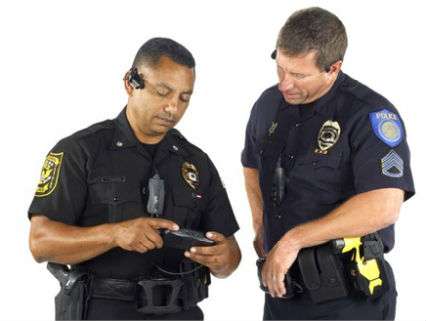Body-Worn Cop Cameras Reduce Citizen Complaints by 93 Percent
The evidence is in: All police should wear cameras.

Police and citizens tend to behave a lot better when they know that their actions are being recorded on video. This insight is bolstered by a fascinating new study, "Contagious Accountability" in the journal Criminal Justice and Behavior. Researchers at Cambridge University persuaded seven different police departments in the U.K. and the U.S. to randomly assign 2,000 officers to don body-worn cameras (BWC) that recorded for their entire shifts. The experiment took place over a year and then the researchers compared the number complaints against officers from the preceding with those lodged during the year that cameras were being worn. The researchers report, "Across the seven experimental sites, 1,539 complaints were lodged against police officers in the 12 months preceding the study, or 1.20 complaints per officer. The number of complaints lodged against the police then dropped in the posttreatment period to 113, or 0.08 complaints per officer. This marks an overall reduction of 93% in the incidence of complaints."
One model considered for how the presence of cameras might change behavior:
BWC + verbal warning ? officer's starting point for the interaction is cooler + suspect's demeanor "cooler" ? officers less likely to react aggressively ? fewer complaints than without BWCs.
Cameras evidently deter both frivolous complaints and excessive police agression. In addition, the researchers found that cameras actually changed the behavior of officers more than that of citizens during encounters. Recall that officers were randomly assigned cameras at every shift and still complaints against police dropped even when individual officers were not wearing them. As the lead researcher Barak Ariel suggested to the BBC, this occurred "because good practice and changes in policing culture were becoming embedded across each force as it adapted to the use of cameras - a phenomenon he described as "contagious accountability."
While it is clear that all police should wear cameras, it is critical that departments adopt transparent and accountable policies with regard to when video should be released to the public and for how long video should be retained.


Show Comments (37)